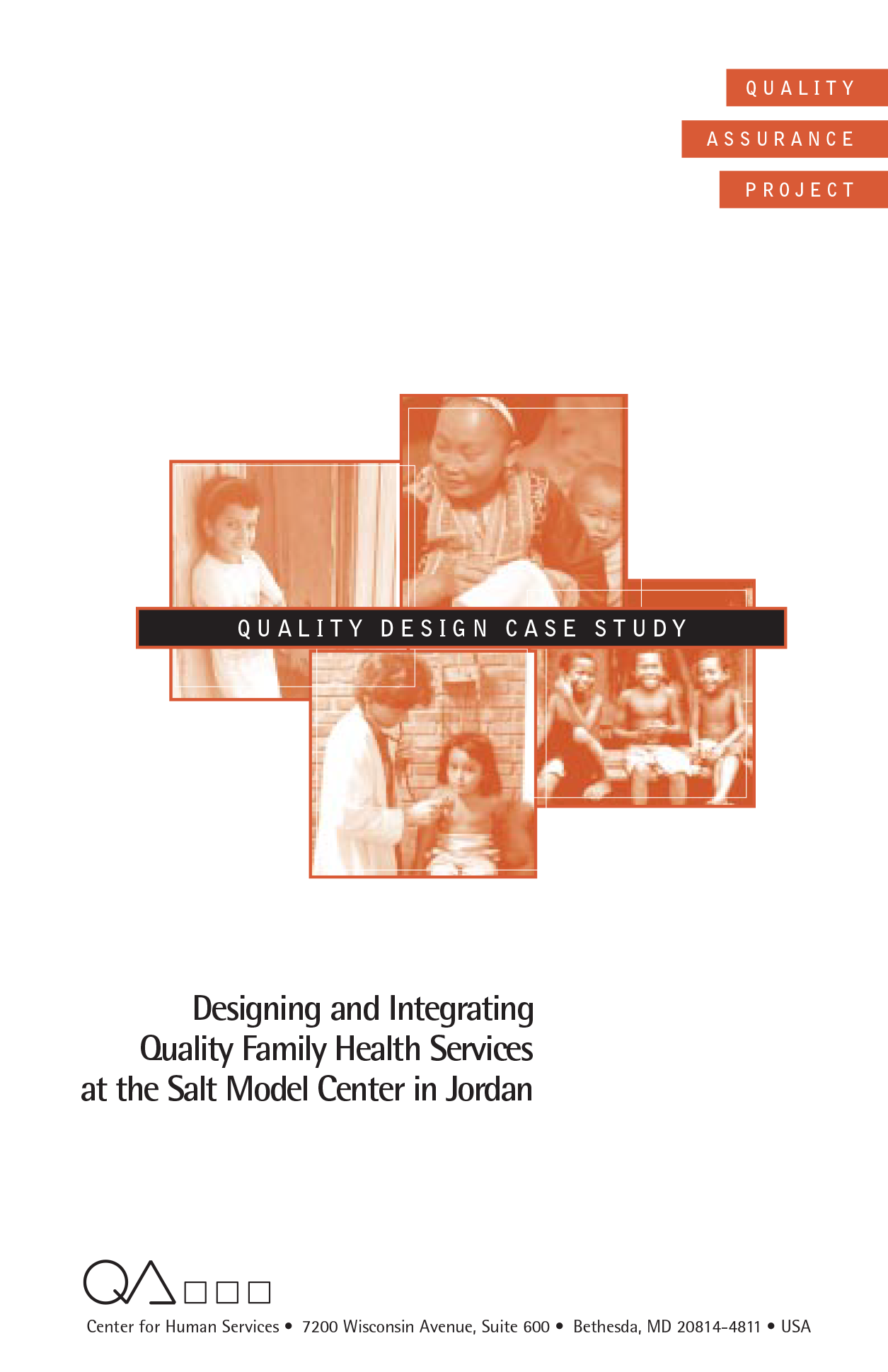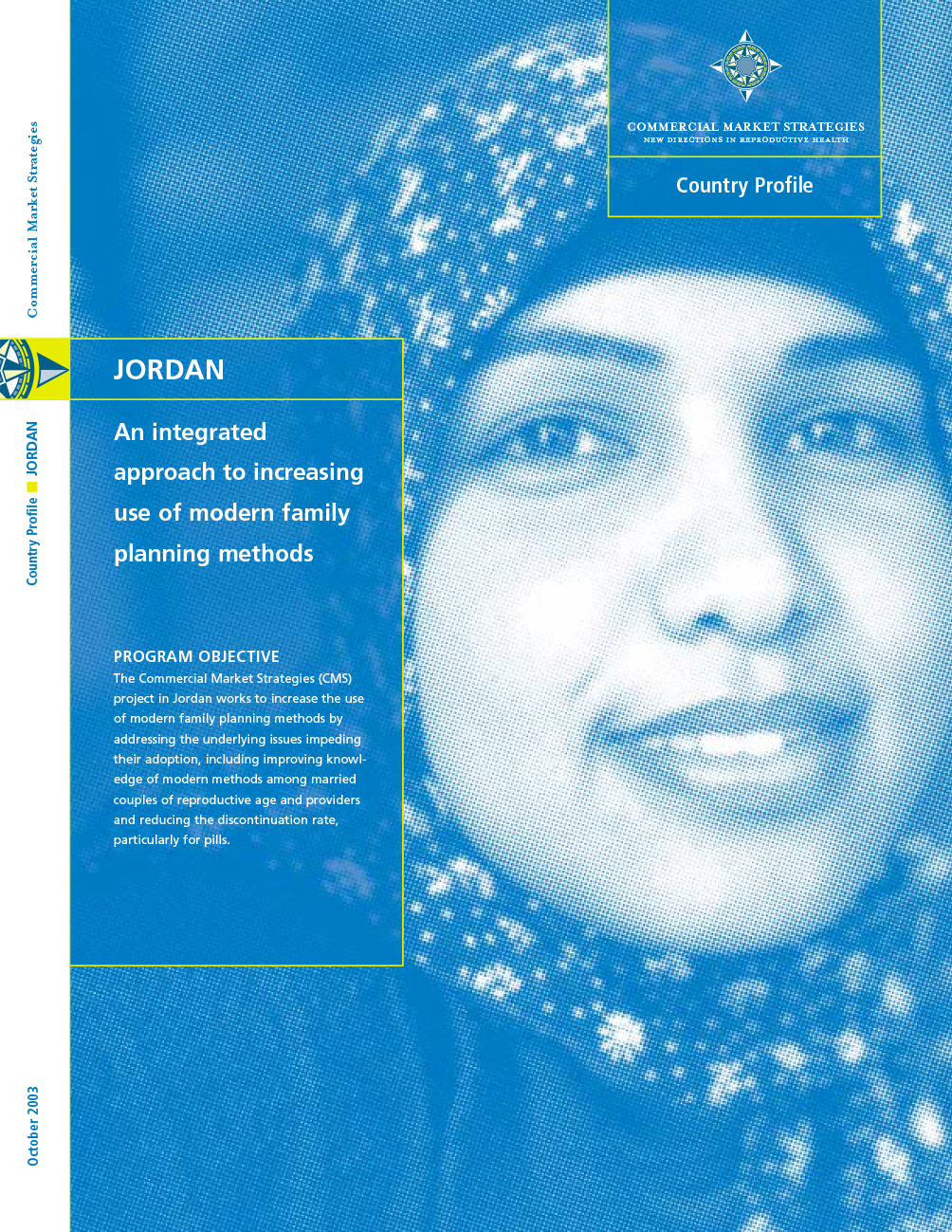
Resource Library
Standards of Care for Health Centers: Volume 3, Reproductive Health
Health for all is an achievable goal for the citizens of the Hashemite Kingdom of Jordan where primary care focuses on providing high quality preventive, promotive, and curative care in a cost-effective manner. The Jordanian Ministry of Health and USAID-funded Primary Health Care Initiatives Project (PHCI) have formed a partnership to reach this goal. The Standards of Care for Health Centers described here represent a milestone in the road towards better health. They are tangible evidence of the considerable thought and effort that has been devoted to promoting quality of care by the Ministry of Health. The purpose of the "Standards" is to ensure that health center staff members have the basic and essential guidance required for safe, effective, and humane service delivery. The Standards are contained in five volumes, each addressing a distinct aspect of health center services. A sixth volume of performance checklists is included with the Standards to facilitate self-assessment and performance review. As a set, the Standards are intended to serve as a convenient reference, a guide for service delivery, and a tool to support performance improvement. When following the guidelines set forth in the Standards, members of health center staff are assured that services meet the accepted standard of care required by their communities. This is one of 6 volumes, and this volume is described below: Volume 3: Reproductive Health This volume contains guidance for the reproductive health care services typically performed by doctors, nurses, and midwives at primary health centers. Antenatal care focuses on initial assessment and continuing support for pregnant women. The postnatal care section guides follow-up care for new mothers and their infants. Family planning includes guidance for counseling and information on the full range of contraceptive methods available in Jordan. A brief section on HIV/AIDS provides general information, basic education, and prevention messages for the community. All procedures described in the volume are accompanied by performance checklists, which reinforce and highlight the essential skills required for high quality reproductive health services.
Resource Type :
Country : Jordan
Year : 2005-05-16T13:45:00
Language : English
Project : SHOPS

Resource Library
Standards of Care for Health Centers: Volume 2, Case Management
Health for all is an achievable goal for the citizens of the Hashemite Kingdom of Jordan where primary care focuses on providing high quality preventive, promotive, and curative care in a cost-effective manner. The Jordanian Ministry of Health and USAID-funded Primary Health Care Initiatives Project (PHCI) have formed a partnership to reach this goal. The Standards of Care for Health Centers described here represent a milestone in the road towards better health. They are tangible evidence of the considerable thought and effort that has been devoted to promoting quality of care by the Ministry of Health. The purpose of the "Standards" is to ensure that health center staff members have the basic and essential guidance required for safe, effective, and humane service delivery. The Standards are contained in five volumes, each addressing a distinct aspect of health center services. A sixth volume of performance checklists is included with the Standards to facilitate self-assessment and performance review. As a set, the Standards are intended to serve as a convenient reference, a guide for service delivery, and a tool to support performance improvement. When following the guidelines set forth in the Standards, members of health center staff are assured that services meet the accepted standard of care required by their communities. This is one of 6 volumes, and this volume is described below: Volume 1: Case Management The five clinical problems addressed in the Case Management guidelines are: diabetes mellitus type II, hypertension, acute respiratory infection, asthma, and diarrhea. These conditions represent a significant percentage of the common medical problems encountered at health centers. Detailed guidance for diagnosis and management of each clinical problem is given, including recommendations for drug management, health education, referral, and follow-up care. Algorithms accompanying each clinical problem inform critical diagnostic or management decision-making. Together, these tools provide reference options for both quick and comprehensive review. Performance checklists complete the package for facilitating self-assessment and peer review.
Resource Type :
Country : Jordan
Year : 2005-05-16T13:45:00
Language : English
Project : SHOPS

Resource Library
Standards of Care for Health Centers: Volume 1, Health Center Management
Health for all is an achievable goal for the citizens of the Hashemite Kingdom of Jordan where primary care focuses on providing high quality preventive, promotive, and curative care in a cost-effective manner. The Jordanian Ministry of Health and USAID-funded Primary Health Care Initiatives Project (PHCI) have formed a partnership to reach this goal. The Standards of Care for Health Centers described here represent a milestone in the road towards better health. They are tangible evidence of the considerable thought and effort that has been devoted to promoting quality of care by the Ministry of Health. The purpose of the "Standards" is to ensure that health center staff members have the basic and essential guidance required for safe, effective, and humane service delivery. The Standards are contained in five volumes, each addressing a distinct aspect of health center services. A sixth volume of performance checklists is included with the Standards to facilitate self-assessment and performance review. As a set, the Standards are intended to serve as a convenient reference, a guide for service delivery, and a tool to support performance improvement. When following the guidelines set forth in the Standards, members of health center staff are assured that services meet the accepted standard of care required by their communities. This is one of 6 volumes, and this volume is described below: Volume 1: Health Center Management The Management Standards are organized in four sections. The first section contains job descriptions for staff providing direct and supportive care at health centers. The descriptions are meant to serve as a job aid for those who hold the positions and their supervisors rather than a model for staffing. The second section conveys the expected values and norms for health center services through a description of patient and provider rights and responsibilities. The third section contains the MOH guidance for managing health center accounting procedures and records. The fourth section contains instructions for procurement of drugs, contraceptives, vaccines, and supplies for laboratory and dental services.
Resource Type : Brief
Country : Jordan
Year : 2005-05-16T13:45:00
Language : English
Project : SHOPS

Resource Library
Designing and Integrating Quality Family Health Services at Salt Model Center in Jordan
The Ministry of Health modified the 10-step quality design process to develop an urban model center for the provision of family planning and other healthcare services. The number of clients seeking family planning services, vaccinations, and other indicators improved dramatically. Activities/tools: Identification of internal and external client needs; sample mission statement, standards, and job description.
Resource Type : Brief
Country : Jordan
Year : 2000-01-01T12:30:00
Language : English
Project : SHOPS

Resource Library

The Quality Assurance Project
Funded by the U.S. Agency for International Development (USAID), the Quality Assurance Project (QAP) seeks to improve the quality of health, population, and nutrition through state-of-the-art technical support. QAP builds on over ten years of experience using modern quality assurance methods to improve healthcare in middle income and developing countries. QAP also addresses human resource management issues that impact quality of care.
Resource Type : Website
Country : Bangladesh, Benin, Bolivia, Cambodia, Egypt, Guatemala, Honduras, Indonesia, Jamaica, Jordan, Kenya, Malawi, Morocco, Nepal, Nicaragua, Nigeria, Pakistan, Peru, Philippines, Russia, Rwanda, South Africa, Tanzania, Uganda, Vietnam, Zambia, Zimbabwe
Year : 2005-01-01T13:45:00
Language : English
Project : SHOPS

Resource Library
Country Profile: Jordan
Country profiles are four- to eight-page summaries of CMS's country programs. They provide an overview of the local context and discuss program goals, design, challenges, evolution, and impact.
Resource Type : Brief
Country : Jordan
Year : 2003-10-01T14:15:00
Language : English
Project : SHOPS

Resource Library
The Contraception-Adoption Process in Jordan
Contraceptive use is a dynamic process, involving the decision to adopt contraception (or not to), the selection of a contraceptive method, and, over time, the decision to continue to use a method, switch to another method, or discontinue using contraception. This study examines some of the elements of that process, including the people women talk with about using contraception and choosing a method, why they switch methods or stop using contraception, and how satisfied they are with their contraceptive method and with the health care providers who are the sources of their contraceptives. The study found that the majority of women who use traditional methods of contraception do not come from dissatisfied former users of modern methods. Almost all women who discontinue use of one method of contraception readopt another, despite their dissatisfaction with the first method. Oral contraceptives are not badly regarded by women and their advisors, though they are, however, frequently abandoned. Husbands are influential in decisions to begin and discontinue using contraception, but have less to say about the choice of contraceptive method. General practitioners (GPs) specializing in women's health are the pivotal actors in advising women, while pharmacists apparently play no significant role in the decision to adopt a contraceptive method or continue to use it. This makes the work of CMS/Jordan more challenging, as pharmacists in Jordan have been very responsive to family planning information, while physicians are much more difficult to reach.
Resource Type : Other
Country : Jordan
Year : 2001-01-01T17:15:00
Language : English
Project : SHOPS

Resource Library
Perceptions of Contraceptives Among Women in Jordan: A Projective Study
The image consumers have of a service or product influences their willingness to adopt the product and use it. Yet the image of contraceptives among consumers is not well understood. In preparation for a new marketing campaign for contraceptives, CMS/Jordan conducted research into the perceptions of Jordanian women of different methods of family planning: voluntary surgical contraception (VSC), the rhythm method, and intrauterine devices (IUDs). By presenting different scenarios and asking a set of open-ended questions, CMS found that VSC and the rhythm method were perceived fairly negatively, while IUD users were judged to be more educated and careful.
Resource Type : Other
Country : Jordan
Year : 2001-03-01T17:15:00
Language : English
Project : SHOPS

Resource Library
Creating Conditions for Greater Private Sector Participation in FP/RH: Benefits for Contraceptive Security
Private sector involvement is crucial not only in helping respond to growing market demand but also in expanding consumer choices and ensuring equity in the contraceptive market. Evidence from many countries shows that the nonpoor benefit disproportionately from free and subsidized public sector services and commodities (Winfrey et al., 2000). A recent analysis of 10 donor-dependent countries reveals that 45 percent of pills and 56 percent of condoms supplied, respectively, by the public sector and social marketing initiatives went to those who could otherwise afford to pay for them (Sine, 2002). Redirecting wealthier/middle-income clients to the private sector will free up scarce donor and public resources for those most vulnerable and in need. A recent market segmentation study in the Philippines shows that shifting middle- and high-income users of government services to the private sector would reduce the burden on the public sector by more than 40 percent (Alano et al., 2002). It is important to recognize that more than one-third of all family planning users in the developing world already obtain contraceptives from the private sector (Rosen and Conly, 1999). In countries such as Cameroon, Colombia, the Dominican Republic, Ghana, and Jordan, more than 60 percent of users obtain their contraceptives from private rather than public sources (Ross et al., 1999). Given that the private sector in many countries is already a major player in the contraceptive market, any feasible contraceptive security plan needs to take into consideration the private sector's current and potential role. This policy brief provides an overview of processes, strategies, and tools that developing countries can adopt to foster complementary public/private sector roles that enhance the private sector's contribution to contraceptive security. Specifically, the brief examines the roles of the public and private sectors in the provision of contraceptives and condoms; and describes strategies/mechanisms used at both the policy and operational levels to mobilize the private sector.
Resource Type : Other
Country : Dominican Republic, Ghana, Jordan, Philippines
Year : 2004-06-01T16:30:00
Language : English
Project : SHOPS

Resource Library
The Commercial Market Strategies Final Report
The Commercial Market Strategies (CMS) project was the flagship private-sector project of USAID's Office of Population and Reproductive Health (G/PRH). CMS was designed to increase the use of family planning and other health products and services through the private sector. From 1998 to 2004, CMS worked in 29 countries to develop and implement a wide range of country programs, technical assistance projects, new initiatives, and global research — all with the aim of expanding access of family planning products and services through commercial approaches and private-sector partnerships. The CMS Final Report provides a comprehensive examination of the technical strategies, accomplishments, results, and lessons learned from the project's programs and activities. A major finding is that commercial organizations are a key resource for donors and development projects in accomplishing health sector objectives, particularly for family planning and reproductive health care. CMS programs involved partnerships with the private sector in a broad range of countries (including India, Morocco, Jordan, Senegal, Uganda, Ghana, Madagascar, Nepal, Nicaragua, and the Philippines), which resulted in improved access to, and quality of, family planning products and services. Through these programs, CMS provided consumers with valuable information about, and access to, essential health products, such as modern contraceptives, oral rehydration therapies, insecticide-treated malaria nets, treatment kits for sexually transmitted infections, and voluntary testing and counseling services for HIV/AIDS. This report also provides detailed information on the various technical strategies used by CMS, including social marketing, support for provider networks, health financing, sustainability for health care non-governmental organizations, corporate social responsibility, and policy.
Resource Type : Report
Country : Ghana, India, Jordan, Madagascar, Morocco, Nepal, Nicaragua, Philippines, Senegal, Uganda
Year : 2004-01-01T15:00:00
Language : English
Project : SHOPS
Pagination
- Previous page
- Page 9
- Next page






